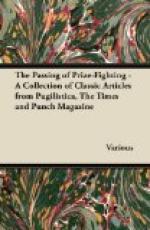The courtiers consist of Lord Dangerfield, who although, or—to speak in a sense more strictly domestic—because, he has got a wife of his own, falls in love with the young spouse of young Lord Whiffle; then there is Sir Paladin Scruple, who, having owned to eighteen separate tender declarations during fourteen years, dangles after Mrs. Charmington, an enchanting widow, and Louisa Dangerfield, an insipid spinster, the latter being in love with his son.
The citizens consist of the famille Bearbinder, parents and daughter, together with Sir Hector Rumbush and a clownish son, who the former insists shall marry the sentimental Barbara Bearbinder, but who, accordingly, does no such thing.
The dialogues of these two “sets” go on quite independent of each other, action there is none, nor plot, nor, indeed, any progression of incident whatever. Lord Dangerfield tells you, in the first scene, he is trying to seduce Lady Whiffle, and you know he won’t get her. Directly you hear that Sir Paladin Scruple has declared in favour of Miss Dangerfield, you are quite sure she will marry the son; in short, there is not the glimmer of an incident throughout either department of the play which you are not scrupulously prepared for—so that the least approach to expectation is nipped in the bud. The whole fable is carefully developed after all the characters have once made their introduction; hence, at least three of the acts consist entirely of events you have been told are going to happen, and of the fulfilment of intentions already expressed.
One character our enumeration has omitted—that of Mr. Winnington, who being a lawyer, stock and marriage broker, is the bosom friend and confident of every character in the piece, and, consequently, is the only person who has intercourse with the two sets of characters. This is a part patched up to be the sticking plaster which holds the two plots together—–the flux that joins the mettlesome Captain Dangerfield (son of the Lord) to the sentimental citoyenne Barbara Bearbinder. In fact, Winnington is the author’s go-between, by which he maketh the twain comedies one—the Temple Bar of the play—for he joineth the “Court” with the “City.”
So much for construction: now for detail. The legitimate object of comedy is the truthful delineation of manners. In life, manners are displayed by what people do, and by what they say. Comedy, therefore, ought to consist of action and dialogue. ("Thank you,” exclaims our reader, “for this wonderful discovery!”) Now we have seen that in “Court and City” there is little action: hence it may be supposed that the brilliancy of the dialogue it was that tempted the author to brush away the well-deserved dust under which the “Discovery” and the “Tender Husband” have been half-a-century imbedded. But this supposition would be entirely erroneous. The courtiers and citizens themselves were but dull company: it was chiefly the acting that kept the audience on the benches and out of their beds.




